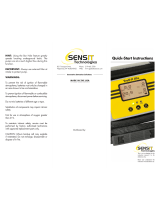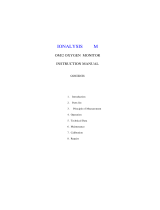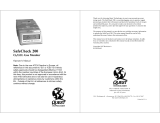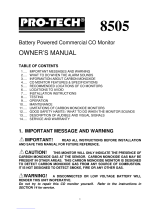Page is loading ...

H
2
S
CO
CH
4
Gas-Pro
User & Operator Manual
Gas-Pro
Multi-gas monitor
M07995/Eng
Issue 11 Dec 2016
Click here for
contents
list
Click here
for navigation
instructions

NAVIGATION INSTRUCTIONS
The symbols in the left-hand margin of each page of the manual will enable you to carry out the
following functions:
Click on this button to display the Contents page.
Click on this button to display the previous page.
Click on this button to display the next page.
Click on this button to display the previous view (use it to return from a reference jump).
Click on this button to display next view (use it to return to a reference jump).
Click this button to print some or all of the document (specic pages can be chosen).
Exit
Click this button to exit the User and Operator Manual.
!
Press the Esc key to display normal Acrobat
©
Controls.
Contents
Contents

3
CONTENTS
PROLOGUE .............................................7
Gas-Pro Overview ...............................................7
Safety Information ........................................8
Unpacking .............................................11
1. Set-up ..............................................12
1.1 Prior to use .................................................12
1.2 Gas-Pro orientation ..........................................12
1.3 Charging ...................................................13
1.4 Fitting a ow plate ...........................................14
1.5 Quick view .................................................15
2. Operation ...........................................16
2.1 General ....................................................16
2.2 Turn on ....................................................16
2.3 Pump test ..................................................20
2.4 Detecting gas ...............................................21
2.4.1 Diffusion monitoring .....................................21
2.4.2 Pumped mode ..........................................22
2.4.3 Manual sampling ........................................23
2.4.3.1 Using the Hand Aspirator .............................23
2.5 Alarms. . . . . . . . . . . . . . . . . . . . . . . . . . . . . . . . . . . . . . . . . . . . . . . . . . . . .24
2.5.1 Low battery alarm .......................................24
2.5.2 Instantaneous alarm .....................................24
2.5.3 Time weighted average alarm (TWA) ........................24
2.5.4 Accepting and clearing alarms ............................25
Exit

4
2.5.5 Sensor types ...........................................25
2.5.5.1 Oxygen sensors ....................................25
2.5.5.2 Electro-chemical sensors .............................25
2.5.5.3 Infra red sensors ...................................25
2.5.5.4 Pellistor sensors ....................................26
2.5.5.5 Pellistor saver mode
.............................26
2.5.5.6 PID .............................................27
2.6 Gas-Pro functions ...........................................28
2.6.1 Accessing the user menus ................................28
2.6.2 Home screen
........................................28
2.6.3 Manual zero
.........................................28
2.6.4 Time weighted average
................................28
2.6.5 Pre-entry check (PEC)
.................................29
2.6.5.1 Starting a Pre-entry check ............................29
2.6.5.2 Carrying out a Pre-entry check ........................30
2.6.6 Peak review
.........................................31
2.6.7 Settings
............................................31
2.6.7.1 User setting
....................................31
2.6.7.2 Pump setting
...................................31
2.6.7.3 Sounder volume
.................................31
2.7 Shut down .................................................32
2.8 Additional Features ..........................................32
2.8.1 +ve Safety™ ............................................32
2.8.1.1 +ve Safety™ indicator meanings .......................32
2.8.2 Data and event logging ...................................33
2.8.3 Bump/Pump functionality .................................33
Exit

5
2.9 Tank Check Mode ...........................................34
2.9.1 Dual-Range Operation ...................................35
2.9.2 Differences with Home Screen .............................35
2.9.2.1 Instantaneous Alarms ...............................35
2.9.2.2 TWA .............................................35
2.9.2.3 Pre-Entry Check (PEC) ..............................35
2.9.2.4 Condence Tone ...................................36
2.9.2.5 Display Backlight ...................................36
3. Gas testing and calibration .............................37
3.1 Introduction ................................................37
3.2 Bump Test Functionality ......................................38
3.2.1 Speedy bump ...........................................39
3.2.1.1 Procedure ........................................39
3.2.2 Smart bump ............................................39
3.2.2.1 Procedure ........................................39
3.2.3 Calibration after bump fail ................................40
3.2.3.1 Procedure ........................................40
3.3 New sensor calibration/service ................................40
3.4 Gas test screen ow .........................................41
4. Icon overview ........................................42
5. Service and maintenance ..............................43
6. PC interface and Portables Pro .......................... 44
6.1 General ....................................................44
6.2 PC interface cable ...........................................44
7. Accessories .........................................45
Exit

6
8. Specication .........................................47
9. Troubleshooting ......................................48
9.1 Pump test failure ............................................48
9.2 Fault screens ...............................................48
9.2.1 Fault Descriptions .......................................49
9.2.2 Fault codes ............................................51
10. Appendices ..........................................52
10.1 Sensors ..................................................52
10.1.1 Toxic .................................................52
10.1.2 Flammable Pellistor Sensors .............................53
10.1.3 Flammable IR Sensors ..................................53
10.1.4 Oxygen ...............................................53
10.1.5 IR ....................................................53
10.1.6 PID ..................................................53
10.2 Sensor Limitations .........................................54
10.3 Charging and run times .....................................55
10.4 Contacts ..................................................56
Warranty ...............................................57
Exit

7
PROLOGUE
Gas-Pro Overview
Thank you for purchasing the new Gas-Pro. At Crowcon we recognise the need for reliable and
robust personal monitors which are sized to be worn and simple to use.
Gas-Pro is a portable monitor capable of detecting up to 5 gases in a compact and wearable design
featuring an optional internal pump. Focused on users and eet managers alike, Gas-Pro offers
application focused solutions giving greater operating time and reduced set up time.
Gas-Pro is classied for use in hazardous areas and gives loud and bright audible and visual alarm
indications as well as a vibrate alert. The top mount display is backlit for ease of use, and the simple
single button solution makes using and training quick and easy.
Contents
Exit
Prologue
Operation
Gas testing
Maintenance
PC software
Accessories
Specication
Troubleshooting
Appendices
Warranty
Set-up

8
Safety Information
• Gas-Pro is a hazardous area certied gas detector and as such must be operated and
maintained in strict accordance with the instructions, warnings and label information included in
this manual. Gas-Pro must be operated within the limitations stated.
• Read and understand all instructions in the operation section of this manual prior to use.
• Before use ensure that the equipment is in good condition, the enclosure is intact has not been
damaged in any way.
• If there is any damage to the equipment do not use, contact your local ofce or agent for repair/
replacement.
• Do not disassemble or substitute components as this may impair intrinsic safety and invalidate
safety certication.
• Only genuine replacement parts must be used; substitute components may invalidate
certication and warranty of the Gas-Pro and accessories, reference “Service and
Maintenance” section for details.
• No live maintenance is permissible.
• Observe all warnings and instructions marked on the unit and within this manual.
• Observe site health and safety procedures for gases being monitored and evacuation procedures.
• Understand the screen display and alarm warnings prior to use.
• If this product is not working properly, read the troubleshooting guide and/or contact your local
ofce or agent, for details reference the ‘Contacts’ section of the manual (see page 52).
• Ensure maintenance, service and calibration is carried out in accordance with the procedures in
the manual and only by trained personnel.
• The Gas-Pro re-chargeable battery must only be charged in non-hazardous (safe) areas.
• Only connect to Gas-Pro in a safe area for charging or communications.
• Gas-Pro must not be charged or have communication to the device, at ambient temperatures
greater than +40°C.
• Charging cable assemblies, whilst nominally providing a voltage of 6.5V, must not exceed a
voltage of 9.1V as this may impair intrinsic safety and invalidate safety certication (Um=9.1V).
• Communication cable assemblies, whilst nominally operating at a voltage of 3.0V TTL, must not
exceed a voltage of 9.1V as this may impair intrinsic safety and invalidate safety certication
(Um=9.1V).
• The devices are intended for use in normal atmospheric conditions of temperature –20 °C to
+55 °C; pressure 80 kPa (0,8 bar) to 110 kPa (1,1 bar); and air with normal oxygen content,
typically 21 % v/v (volume/volume).
Contents
Exit
Prologue
Operation
Gas testing
Maintenance
PC software
Accessories
Specication
Troubleshooting
Appendices
Warranty
Set-up

9
• Gas-Pro may be used in Zones 1 and 2, for Group llA, llB and llC gases and vapours and for
Temperature Classes T1, T2, T3 and T4. (see Certication labels below).
• Certication labels
The certication marking is as follows:
• Gas-Pro is certied for use in ambient temperatures in the range -20°C to +55°C (-4 to 131°F).
• Applicable Standards
Refer to equipment marking for conrmation of applicable certication before use.
IECEx
IEC 60079-0: 2013, 6th Edition
Explosive atmospheres – Part 0: Equipment - General requirements
IEC 60079-1:2007, 6th Edition
Explosive atmospheres – Part 1: Equipment protection by ameproof enclosures “d”
IEC 60079-11: 2012, 6th Edition
Explosive atmospheres - Part 11: Equipment protection by intrinsic safety “i”
Ex d ia IIC T4 Gb Tamb -20°C to +55°C
IECEx ULD 11.0004X
UL certification label
CH4
1180
Um = 9.1V
WA RNING -
DO NOT CHA RGE THE BATTERY OR
CONNECT TO THE EQUIPMENT IN A
HAZARDOUS LOCATION.
REA D A ND UNDERSTA ND THE MA NUA L
B EFORE USE.
172 BROOK DRIVE
MILTON PARK, ABINGDON
OX14 4SD
UNITED KINGDOM
66Y6
T4 Tamb: -20°C to +55°C
FOR USE IN HA ZA RDOUS
LOCATIONS, CLA SS I, DIVISION 1,
GROUPS A , B, C & D.
ONLY AS TO INTRINSIC SA FETY
ATEX/ certification labelIECEx MED certification label
1180
CH4
II 2 G
IECEx ULD 11.0004X
DEMKO 11ATEX1031772X
WARNING
DO NOT CHARGE THE BATTERY OR
CONNECT TO THE EQUIPMENT IN A
HAZARDOUS LOCATION.
READ AND UNDERSTAND THE MANUAL
BEFORE USE.
172 BROOK DRIVE
MILTON PARK, ABINGDON
OX14 4SD
UNITED KINGDOM
Um = 9.1V
Ex d ia IIC T4 Gb -20°C Ta +55°C
Contents
Exit
Prologue
Operation
Gas testing
Maintenance
PC software
Accessories
Specication
Troubleshooting
Appendices
Warranty
Set-up

10
ATEX
EN 60079-0: 2012 + A11: 2013
Explosive atmospheres – Part 0: Equipment - General requirements
EN 60079-1:2007
Explosive atmospheres – Part 1: Equipment protection by ameproof enclosures “d”
EN 60079-11: 2012
Explosive atmospheres - Part 11: Equipment protection by intrinsic safety “i”
II 2 G Ex d ia IIC T4 Gb Tamb -20°C to +55°C
DEMKO 11 ATEX 1031772X
UL
Gas detector use in hazardous locations Class 1 Division 1, Groups A, B, C and D only as to
intrinsic safety.
UL 913 Applicable Edition of the UL standard
UL60079-0 Applicable Edition of the UL standard
UL60079-11 Applicable Edition of the UL standard
Contents
Exit
Prologue
Operation
Gas testing
Maintenance
PC software
Accessories
Specication
Troubleshooting
Appendices
Warranty
Set-up

11
Unpacking
Remove the Gas-Pro from the packaging. The standard accessories are under the supporting trays.
The following items will be included as standard:
Box contents
• Gas-Pro
• Quick Start Guide
• CD Manual
• Calibration report
The following items are optional:
Optional items
• Charger cradle
• Charger lead (see Power & Communication Cables Technical Data)
• Flow plate (standard for pumped units)
i
If you have ordered a charger and/or cradle this will also be included in the box.
Further accessories are available but will not be contained in the box (see Section 7).
i
Gas-Pro in the off state can be left on charge indenitely
i
Should the unit be deep discharged, the charging indication will not be shown until the
unit has been charging for 1 hour and the operator button has been pressed.
i
When on and charging a warning will advise the user to turn the Gas-Pro off after 12
hours or remove from charge.
i
Store the battery in a full state and recharge at least once every 3 months.
Contents
Exit
Prologue
Operation
Gas testing
Maintenance
PC software
Accessories
Specication
Troubleshooting
Appendices
Warranty
Set-up

12
1. Set-up
1.1 Prior to use
Before use, the Gas-Pro should always be checked for any signs of physical damage.
Gas-Pro uses a Lithium Ion (Li-ion) battery pack and should arrive with sufcient charge to be used
straight out the box. However, if this is the rst time of use, you may need to charge the battery to
attain the full operating time (see Charging on page 13).
For battery run times, see the table on page 55.
i
The actual operating time will depend on the types of sensor installed.
1.2 Gas-Pro orientation
Figure 1: Gas-Pro
À D-ring à Sounder Æ Sensor apertures É Charging cable
Á Alarm bars Ä Operator button Ç Dual colour LCD display Certication label
 +ve Safety™ indicator Å Pump inlet/outlet* È Alligator clip
* Blanked for non-pumped unit.
À
Ç
Ã
É
È
Ä
Â
Å
Æ
Á
Contents
Exit
Prologue
Operation
Gas testing
Maintenance
PC software
Accessories
Specication
Troubleshooting
Appendices
Warranty
Set-up

13
1.3 Charging
Charging should only take place in non-hazardous (safe) areas. To charge, simply plug the cable À into
the charging socket Á on the Gas-Pro and turn on the mains supply (see Figure 2 below). If a charging
cradle or vehicle cradle is being used, ensure the Gas-Pro ts rmly on to the power connector.
i
The charger must be able to supply 6.5V@ 450mA with an output voltage that does not
exceed 9.1V (Um).
Figure 2: Charger connection
When off, to show the Gas-Pro is charging, both LEDs within the alarm bars will ash red and will change
to green once fully charged. This state will continue until the trickle charge is complete. Charging will then
terminate showing no indication. The screen will also show the battery icon lling in the middle of the
screen when the Gas-Pro is off, and in the bottom left-hand corner when it is on. The battery icon contains
a maximum of six segments to indicate the battery’s state of charge. For example, with three segments
shown and a fourth ashing, the battery is 50% charged
À, and when all six are shown, the battery is fully
charged Á (see Figure 3 below).
Figure 3: Charging indications
À
Á
À Á
Contents
Exit
Prologue
Operation
Gas testing
Maintenance
PC software
Accessories
Specication
Troubleshooting
Appendices
Warranty
Set-up

14
1.4 Fitting a ow plate
A ow plate can be used for a number of applications including pumped operation (remote sampling),
manual gas test/calibration or for manual sampling. If the pumped ow plate is attached before turning
the Gas-Pro on and the Gas-Pro includes a pump, a pump test will commence as part of the start up
process (see Pump test on page 20).
There are 3 types of ow plate: one for a Gas-Pro with internal pump, one for a Gas-Pro with no
pump and a non-magnetic version for PC calibration or for manual sampling. Although there is no
difference to the attachment procedure, they are not interchangeable (see Figure 4). The pumped
ow plate has the
symbol in the top left corner to aid recognition.
Figure 4: Pumped and non pumped ow plates
À Pumped ow plate
Á Non pumped ow plate
 PC Cal/Test Flow Plate
Check the ow plate’s gasket is free from dirt and has not been damaged prior to tting. To t a ow
plate, locate it over the Gas-Pro sensors as shown in Figure 5 and tighten the securing screw
À.
Figure 5: Fitting a ow plate
The ow plate includes a quick connect tting for attaching sample tubes and probes.
À
Á Â
À
Contents
Exit
Prologue
Operation
Gas testing
Maintenance
PC software
Accessories
Specication
Troubleshooting
Appendices
Warranty
Set-up

15
1.5 Quick view
Even when the detector is off, users can display details about the conguration of the Gas-Pro by
momentarily pressing the operator button for one audible blip. The LED to the left of the display will
ash red once and the Quick view screen shown in Figure 6 below will be displayed for 10 seconds.
Figure 6: Quick view display
À Gas type and unit detected
Á Battery status
 Quickview icon
à ID or serial number
i
The +ve Safety™ LED status is also shown (see Figure 1).
Ã
Á
À
Â
Contents
Exit
Prologue
Operation
Gas testing
Maintenance
PC software
Accessories
Specication
Troubleshooting
Appendices
Warranty
Set-up

16
2. Operation
2.1 General
!
Before turning the Gas-Pro on, ensure it is in ‘clean air’ (i.e. outside, in normal air, away
from any plant process or suspected gas location). This will allow the Gas-Pro to be
zeroed using clean air as the base point. If the Gas-Pro is zeroed in contaminated air a
false gas reading can result, or the zero could fail.
2.2 Turn on
In ‘clean air’, turn on the Gas-Pro by holding down the operator button for 3 audible blips. The Gas-
Pro will warm up, going through a series of automatic processes as follows:
Firstly a test screen pattern will be generated. Watch this to ensure there are no missing pixels on
your display screen.
Whilst the Gas-Pro is warming up, two screens will be displayed.
Figure 7: Initial screens at turn on
After a successful test cycle the LCD screen will remain green, the sounder and LEDs will indicate
the Gas-Pro is healthy.
i
A Gas-Pro tted with a pump is congured as standard to start the pump automatically
when switched on, provided that a ow plate is tted. Such a Gas-Pro tests the pump
automatically at this point (for more details on this, see Pump test on page 20).
i
If the battery level is low, an alarm will sound, and the battery icon on the screen will be partial.
i
If a second ‘splash’ screen has been congured via Portables Pro it will be shown next in
the turn on sequence.
Contents
Exit
Prologue
Operation
Gas testing
Maintenance
PC software
Accessories
Specication
Troubleshooting
Appendices
Warranty
Set-up

17
If the Gas-Pro is congured for regular Gas Testing (Bump Test), the date of the last Gas Test will
also be shown (for more information on Gas Testing, see Gas testing and calibration on page 37).
Figure 8: Gas test due screen
The next screen indicates when the Gas-Pro was last calibrated. It also indicates when the next calibration
is due with a warning symbol
next to the number of days left, if this is fewer than 30 days. If the
calibration due date has expired, the number of days gure is not displayed and the warning symbol
ashes.
Figure 9: Calibration due screen
If the calibration due lockout feature has been enabled the lockout icon
will be displayed and the
Gas-Pro will not proceed past this point.
Contents
Exit
Prologue
Operation
Gas testing
Maintenance
PC software
Accessories
Specication
Troubleshooting
Appendices
Warranty
Set-up

18
The next screen (Figure 10) will display the current detector settings (for more information on these
settings, see Gas-Pro functions on page 28).
Figure 10: Current settings screen
The Autozero Conrm screen will be displayed next.
Figure 11: Autozero conrm screen
An Autozero should not be performed unless the Gas-Pro is in clean air. Press the operator button to
enter the Autozero mode, otherwise the countdown will progress and will not perform a zero.
If the operator button is not pressed the countdown will complete and this function will be skipped.
Contents
Exit
Prologue
Operation
Gas testing
Maintenance
PC software
Accessories
Specication
Troubleshooting
Appendices
Warranty
Set-up

19
When the autozero has nished or been skipped, the next screen is the home screen (Figure 12)
and displays the gas levels.
The next screen on the Tank-Pro edition of Gas-Pro is the Tank Check
screen. See the Tank
Check Mode section (see Section 2.9 on page 34) for more information.
i
Figure 12 shown below is for 5 gases in clean air.
Figure 12: Home screen
À Gas type
Á Unit
 Level
à Home Screen icon
Ä Battery level
Å Pump present
(rotating when on)
In ‘clean air’, CO
2
and Oxygen levels are typically 0.04% and 20.9% respectively. In zero mode,
these gases will actually run an ‘offset’ zero.
The Gas-Pro is now ready for use.
!
From the 1st November 2010, EN60079-29 part 1 has been harmonised under the ATEX
directive 94/9/EC. Therefore to comply with the ATEX directive, portable apparatus sensing
ammable gases should have a functional check with ammable gas before each day of
use (see Gas testing and calibration on page 37). Other testing regimes may be employed
depending on local circumstances.
À Á
Â
Ã
Ä
Å
Contents
Exit
Prologue
Operation
Gas testing
Maintenance
PC software
Accessories
Specication
Troubleshooting
Appendices
Warranty
Set-up

20
2.3 Pump test
In the default conguration, a pumped Gas-Pro with a ow plate attached (see Fitting a ow plate on
page 12) will run a pump test during the start up process. A pump test will also be run whenever a
ow plate is attached during normal operation.
i
If the Gas-Pro is congured for Bump functionality, the Bump/Pump prompt will be
displayed if a ow plate is attached and a gas bump test is due or the Gas-Pro is placed in
a Q-Test module during normal use (see Bump/Pump functionality on page 33).
i
Prior to tting, the ow plate’s gasket should be checked for any damage.
The pump test ensures accurate sealing as well as monitoring pump performance.
The user will need to cover the pump inlet
À (see Figure 13 below) when prompted to do so by the
symbol on the screen.
Figure 13: Pump inlet
When the test has nished, the pump will either pass
or fail .
If the pump test takes place during start-up and the Gas-Pro passes, the pump will remain on and
the start-up process will continue as normal. If the test is passed during normal use, the Gas-Pro will
remain in the pumped mode until the ow plate is removed.
On failing the pump test the fail screen will persist with an audible alert until the button is pressed
and the test repeats OR the ow plate is removed and the Gas-Pro returns to unpumped operation.
For further detail on failing a pump test see Pump test failure on page 48.
À
Contents
Exit
Prologue
Operation
Gas testing
Maintenance
PC software
Accessories
Specication
Troubleshooting
Appendices
Warranty
Set-up
/




